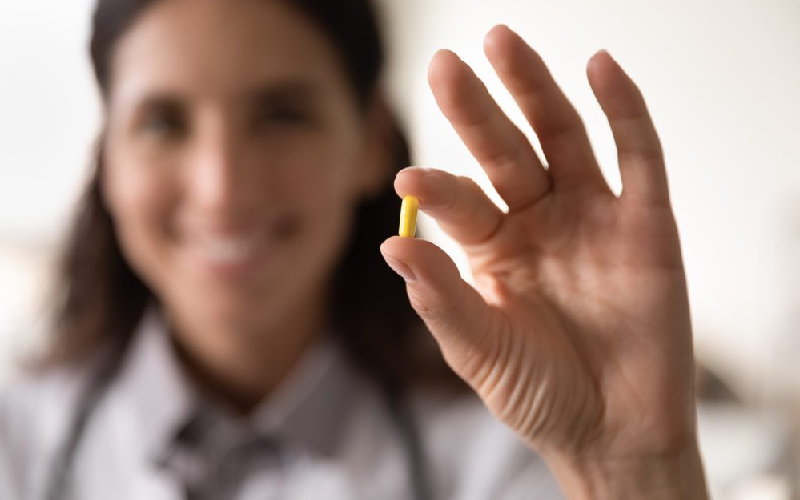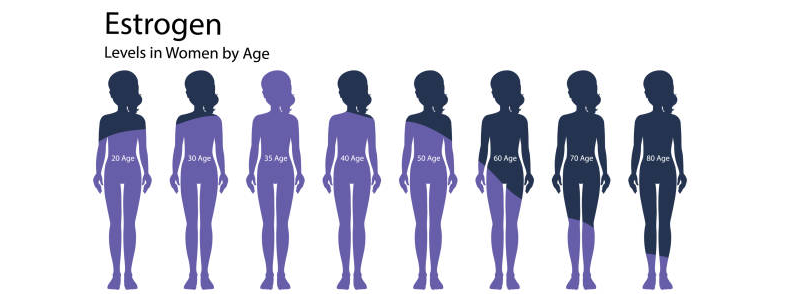
Are you struggling with weight loss despite your best efforts? Have you ever considered that hormonal imbalances might be the missing piece of the puzzle? Many factors can contribute to hormonal imbalances, which in turn, can significantly impact your weight loss journey. Here we explore the fascinating world of bioidentical hormones, Bioidentical Hormone Replacement Therapy (BHRT), and their potential role in helping you achieve your weight loss goals.
Contents
Introduction to Bioidentical Hormones and Weight Loss
The journey to weight loss can often be a challenging and complex process. Many factors influence our ability to shed pounds, including genetics, lifestyle choices, and hormonal imbalances. One often-overlooked aspect of weight management is the role of bioidentical hormones.
Definition of Bioidentical Hormones
Bioidentical hormones are chemically identical to the hormones produced by our bodies. They are derived from plant sources, such as soy or yam, and are designed to replicate the molecular structure of our natural hormones. The goal of bioidentical hormone therapy is to restore balance and alleviate symptoms related to hormonal imbalances, which can also have a significant impact on weight management [1].
Importance of Hormones in Weight Management
Hormones play a crucial role in regulating various bodily processes, including metabolism, appetite, and fat distribution. Imbalances in hormones like estrogen, progesterone, and testosterone can lead to weight gain or make it difficult to lose weight, even when following a healthy diet and exercise regimen. By understanding the role of these hormones in weight management, we can better tailor our weight loss strategies and potentially overcome stubborn weight loss barriers.

Understanding the Role of Hormones in Weight Loss
Hormones are chemical messengers that regulate many physiological processes, including growth, metabolism, and reproduction. In the context of weight loss, three primary hormones play a significant role: estrogen, progesterone, and testosterone. Understanding the functions of these hormones and their impact on weight management can provide valuable insights for anyone struggling with weight loss.
Estrogen
Estrogen is a female sex hormone responsible for the development and regulation of the female reproductive system. Although predominantly found in women, estrogen also exists in men, albeit in smaller amounts. Estrogen plays a critical role in weight management through its impact on metabolism and fat distribution [2].
Role in Metabolism
Estrogen has a direct influence on the body’s metabolism. It helps regulate insulin, the hormone responsible for controlling blood sugar levels. When estrogen levels are balanced, insulin functions effectively, ensuring that blood sugar levels are stable and minimizing the risk of weight gain. However, low estrogen levels can cause insulin resistance, leading to elevated blood sugar levels, increased fat storage, and difficulty losing weight.
Impact on Fat Distribution
Estrogen also plays a role in determining where fat is stored in the body. Women with healthy estrogen levels tend to have a more favorable fat distribution, with fat stored primarily in the hips, thighs, and buttocks. However, when estrogen levels decline, fat storage may shift toward the abdominal area, which can increase the risk of developing cardiovascular disease and type 2 diabetes.
Progesterone
Progesterone is another female sex hormone that plays a vital role in the menstrual cycle and pregnancy. Like estrogen, it also has implications for weight management, particularly when it comes to its relationship with estrogen and its effects on water retention [3].
Relationship with Estrogen
Progesterone and estrogen work together to maintain hormonal balance in the body. When progesterone levels are low relative to estrogen, a condition known as estrogen dominance may occur. This hormonal imbalance can lead to water retention, bloating, and weight gain. By restoring balance between progesterone and estrogen, it may be possible to alleviate these symptoms and support weight loss.
Effects on Water Retention and Weight Loss
Progesterone has natural diuretic properties, meaning that it can help reduce water retention in the body. When progesterone levels are adequate, water retention is minimized, and weight loss may become more manageable. However, low progesterone levels can result in increased water retention, making it difficult to lose weight despite efforts to maintain a healthy diet and exercise regimen.
Testosterone
Testosterone is the primary male sex hormone, responsible for the development of male reproductive tissues and secondary sexual characteristics. However, it is also present in women, albeit in smaller amounts. Testosterone plays a crucial role in weight management for both genders through its influence on muscle mass and metabolism [4].
Influence on Muscle Mass and Metabolism
Testosterone helps promote the growth and maintenance of lean muscle mass. Having more muscle mass increases the body’s resting metabolic rate, meaning that the body burns more calories at rest. As a result, individuals with adequate testosterone levels may find it easier to maintain a healthy weight or lose excess body fat.
Importance for Both Genders
While testosterone is often associated with men, it is essential for women’s weight management as well. Women with low testosterone levels may experience difficulty losing weight due to reduced muscle mass and a slower metabolism. By ensuring that testosterone levels are within a healthy range, women can optimize their weight loss efforts and improve overall body composition.

Bioidentical Hormone Replacement Therapy (BHRT) and Weight Loss
Bioidentical Hormone Replacement Therapy (BHRT) is a treatment option for individuals experiencing hormonal imbalances that may be impacting their weight loss efforts. By restoring hormonal balance with bioidentical hormones, it may be possible to alleviate symptoms related to hormonal imbalances, including weight gain or difficulty losing weight.
BHRT vs. Conventional Hormone Replacement Therapy
Traditional hormone replacement therapy (HRT) typically utilizes synthetic hormones that are chemically similar but not identical to the hormones produced by the human body. In contrast, BHRT uses hormones that are chemically identical to those produced naturally. This similarity in structure may result in fewer side effects and a more effective treatment for hormonal imbalances.
One significant advantage of BHRT over conventional HRT is the ability to customize treatment plans to meet the unique needs of each individual [5]. While conventional HRT often involves a one-size-fits-all approach, BHRT can be tailored to the specific hormonal imbalances and symptoms experienced by each patient.
Identifying Hormonal Imbalances
If you suspect that hormonal imbalances may be affecting your weight loss journey, it is essential to identify the specific imbalances and their underlying causes. Some common symptoms of hormonal imbalances include:
Common Symptoms
- Unexplained weight gain or difficulty losing weight
- Fatigue and low energy levels
- Mood swings and irritability
- Changes in appetite or food cravings
- Sleep disturbances
- Changes in body hair growth or texture
Testing for Imbalances
If you are experiencing these symptoms, it is crucial to consult with a healthcare professional to determine the root cause. They may recommend specific tests, such as blood tests or saliva tests, to measure hormone levels and identify any imbalances. These tests can provide valuable insights into which hormones may be contributing to your weight loss difficulties and help guide the development of a personalized BHRT treatment plan.
Tailoring BHRT for Individual Needs
Once hormonal imbalances have been identified, a healthcare provider can create a customized BHRT treatment plan to address the specific imbalances and symptoms experienced by each patient. There are several ways to tailor BHRT to individual needs:
Customized Formulations
Bioidentical hormones can be compounded into custom formulations that precisely match the hormonal needs of each patient. This personalized approach can help ensure that the treatment effectively addresses the root cause of the hormonal imbalance and its associated symptoms.
Methods of Delivery
There are various methods of delivering bioidentical hormones, including oral capsules, creams, gels, patches, and injections. Each method has its advantages and drawbacks, and the most appropriate method will depend on the individual’s needs and preferences. A healthcare provider can help determine the best delivery method based on factors such as the specific hormones being replaced, the desired dosage, and the patient’s medical history.
Bioidentical Hormones Pellets In BHRT
Bioidentical hormone pellets are a unique and innovative method of delivering hormones to individuals undergoing Bioidentical Hormone Replacement Therapy (BHRT). These small, rice-sized pellets are typically made from plant-derived sources, such as soy or yams, and are custom-compounded to match the hormonal needs of each patient.
The pellets are placed under the skin, usually in the fatty tissue of the hip or buttock area, through a minimally invasive procedure performed by a healthcare professional. Once implanted, the pellets gradually release hormones into the bloodstream over a period of several months, providing consistent and stable hormone levels without the need for daily administration.
The use of bioidentical hormone pellets offers several advantages over other delivery methods [6]. One key benefit is the convenience and ease of use, as the pellets only need to be implanted every few months, eliminating the need for daily hormone administration. Additionally, the pellets provide a consistent hormone release, avoiding the fluctuations in hormone levels that can occur with other methods, which may contribute to more stable mood, energy levels, and overall well-being.
BioTE Pellets
One particular brand of bioidentical hormone pellets is BioTE, which has gained popularity due to its focus on quality and precision. BioTE pellets are created with high-quality ingredients and undergo a stringent manufacturing process to ensure the purity and potency of the hormones.
They are designed to provide a steady release of hormones over an extended period, typically 3 to 6 months, depending on the individual’s needs and metabolism. This sustained-release approach aims to mimic the body’s natural hormone production, providing a more stable and effective treatment compared to other methods, such as oral or transdermal administration.
Bioidentical Hormone Therapy Cost
The cost of Bioidentical Hormone Replacement Therapy (BHRT) can vary significantly depending on several factors, including the specific hormones being replaced, the method of delivery, the duration of the treatment, and the healthcare provider’s fees. In general, BHRT can be more expensive than conventional hormone replacement therapy, mainly due to the customization and compounding processes involved in creating bioidentical hormones.
For instance, the cost of bioidentical hormone pellets, such as BioTE, can range from a few hundred to over a thousand dollars per insertion, depending on the dosage and the provider’s fees. This cost typically covers the consultation, lab work, pellet insertion procedure, and any necessary follow-up appointments. It is important to note that most insurance plans do not cover the cost of BHRT, as it is often considered an elective treatment. Therefore, patients may need to pay for the therapy out-of-pocket. However, some providers offer payment plans or discounts to help make the treatment more affordable.

Potential Benefits of BHRT for Weight Loss
When hormonal imbalances are addressed with Bioidentical Hormone Replacement Therapy (BHRT), individuals may experience a variety of benefits that can positively impact their weight loss efforts [7]. It is important to note that BHRT is not a standalone weight loss solution but can support and enhance overall weight management when combined with healthy lifestyle choices.
Improved Metabolic Function
By restoring hormonal balance, BHRT can help improve metabolic function, allowing the body to more efficiently process and utilize nutrients. An optimized metabolism can result in increased calorie burning, which can support weight loss efforts and help maintain a healthy weight.
Enhanced Energy Levels
Hormonal imbalances can lead to fatigue and low energy levels, making it difficult to engage in regular physical activity. BHRT can help increase energy levels by addressing the underlying hormonal imbalances, enabling individuals to be more active and consistent with their exercise routines.
Reduced Food Cravings
Hormonal imbalances can also contribute to changes in appetite and food cravings, which can make it challenging to adhere to a healthy diet. By stabilizing hormone levels, BHRT may help reduce cravings for unhealthy foods and support better dietary choices, ultimately aiding in weight loss.
Better Sleep Quality
Sleep plays a vital role in weight management, as it allows the body to recover and maintain hormonal balance. Hormonal imbalances can disrupt sleep patterns, contributing to weight gain or difficulty losing weight. BHRT can help improve sleep quality by addressing the hormonal imbalances that may be interfering with restful sleep.
Optimized Muscle Mass
As discussed earlier, hormones like testosterone play a crucial role in maintaining muscle mass, which is essential for a healthy metabolism and weight management. By restoring hormone levels with BHRT, individuals may experience an increase in lean muscle mass, which can contribute to a higher resting metabolic rate and more efficient calorie burning.
Risks and Side Effects of BHRT
While Bioidentical Hormone Replacement Therapy (BHRT) can offer potential benefits for weight loss and overall health, it is essential to be aware of the possible risks and side effects associated with this treatment. Just as with any medical intervention, it is crucial to weigh the potential benefits against the risks and discuss them with a healthcare professional before beginning BHRT.
Common Side Effects
Although bioidentical hormones are designed to mimic the body’s natural hormones, some individuals may still experience side effects. These side effects can vary depending on the specific hormones being replaced and the method of delivery. Some common side effects may include:
- Breast tenderness or swelling
- Bloating and water retention
- Headaches or migraines
- Mood swings or irritability
- Changes in menstrual cycle (for women)
- Acne or oily skin
It is important to note that many of these side effects may be temporary and could subside as the body adjusts to the new hormone levels. However, if side effects persist or worsen, it is crucial to consult with a healthcare professional to discuss potential adjustments to the treatment plan.
Potential Risks
While BHRT is generally considered to be safer than conventional hormone replacement therapy, there are still potential risks associated with its use. Some of these risks may include:
Blood Clots
Hormone replacement therapy, including BHRT, may increase the risk of developing blood clots. Blood clots can be dangerous and potentially life-threatening if they travel to vital organs, such as the lungs or brain.
Cardiovascular Issues
Some studies have suggested that hormone replacement therapy may increase the risk of cardiovascular events, such as heart attacks or strokes. However, more research is needed to determine the precise relationship between BHRT and cardiovascular risk.
Breast Cancer
There is some evidence to suggest that hormone replacement therapy, particularly when estrogen is used without progesterone, may increase the risk of breast cancer. However, the relationship between BHRT and breast cancer risk is still not fully understood and requires further investigation.
Importance of Monitoring and Adjusting Treatment
To minimize the risks and side effects associated with BHRT, it is crucial to work closely with a healthcare professional to monitor hormone levels and make adjustments to the treatment plan as needed. Regular follow-up appointments and testing can help ensure that hormone levels remain balanced and that any side effects or risks are promptly addressed. By carefully monitoring and adjusting treatment, individuals can maximize the benefits of BHRT while minimizing potential risks.
Lifestyle Factors to Enhance the Efficacy of BHRT
To maximize the potential benefits of Bioidentical Hormone Replacement Therapy (BHRT) for weight loss and overall health, it is essential to complement the treatment with healthy lifestyle choices. By adopting and maintaining habits that support hormonal balance and overall well-being, individuals can enhance the efficacy of BHRT and achieve optimal results.
Nutrition
A balanced diet is crucial for supporting hormonal health and weight loss efforts. To ensure optimal nutrition during BHRT, consider the following recommendations:
- Eat a diet rich in whole, unprocessed foods, including fruits, vegetables, lean proteins, whole grains, and healthy fats.
- Limit consumption of refined sugars and processed foods, which can contribute to hormonal imbalances and weight gain.
- Stay well-hydrated by drinking plenty of water throughout the day.
- Consume foods that are rich in phytoestrogens, such as flaxseeds, soy, and legumes, which can help balance estrogen levels.
Exercise
Regular physical activity is essential for maintaining a healthy weight, boosting metabolism, and promoting hormonal balance. To support the efficacy of BHRT, consider incorporating the following exercise recommendations:
- Engage in at least 150 minutes of moderate-intensity aerobic exercise per week, such as brisk walking, swimming, or cycling.
- Include strength training exercises at least two days per week to build and maintain lean muscle mass, which supports a healthy metabolism.
- Participate in stress-reducing activities, such as yoga, tai chi, or meditation, to promote hormonal balance and overall well-being.
Sleep
Adequate sleep is crucial for hormonal balance and overall health. Poor sleep can disrupt hormone levels and hinder weight loss efforts. To improve sleep quality and support BHRT, consider the following sleep hygiene practices:
- Aim for 7-9 hours of sleep each night.
- Establish a consistent sleep schedule by going to bed and waking up at the same time each day, even on weekends.
- Create a relaxing bedtime routine, such as reading, taking a warm bath, or practicing deep breathing exercises.
- Ensure your sleep environment is comfortable, dark, quiet, and cool.
Stress Management
Chronic stress can negatively impact hormone levels and overall health. To manage stress and support the efficacy of BHRT, consider adopting stress-reduction techniques, such as:
- Practicing mindfulness meditation or deep breathing exercises.
- Engaging in hobbies or activities that bring joy and relaxation.
- Building a strong social support network, including friends, family, or support groups.
- Seeking professional help from a therapist or counselor if necessary.
References
[1] Bioidentical hormones: Are they safer?
[2] Revealing estrogen’s secret role in obesity
[3] https://www.ahajournals.org/doi/10.1161/HYPERTENSIONAHA.119.12802
[4] Estrogen and Brain Health: The Female Hormone’s Cognitive Effects
[5] Differences between compounded BHRT and conventional HRT
[6] Hormone pellet therapy: Procedure, benefits, and safety
[7] Bioidentical Hormones: Therapy, Uses, Safety & Side Effects

